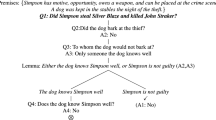Abstract
This essay examines the perspective from which Bas van Fraassen, in his book, The Empirical Stance, explains the project of empiricism. I argue that this perspective is a robustly transcendental perspective, which suggests that the tradition of empiricism lacks the resources to explain itself. I offer an alternative history of epistemic voluntarism in twentieth-century philosophy to the history van Fraassen himself provides, one that finds the novelty in van Fraassen’s own views to be precisely his reintroduction of the knowing mind into the tradition of analytic philosophy of science.
Similar content being viewed by others
References
Carnap R. (1967) The logical structure of the world. University of California Press, Berkeley
Friedman, M. (Ed.) (1999). Tolerance and analyticity in Carnap’s philosophy of mathematics. In Reconsidering logical positivism (pp. 198–233). Cambridge: Cambridge University Press.
Goodman N. (1951) The structure of appearance. Harvard University Press, Cambridge, MA
Lakatos, I. (Ed.) (1978). History of science and its rational reconstructions. In The methodology of scientific research programmes (pp. 102–138). Cambridge: Cambridge University Press.
Popper K. (1972) Objective Knowledge. Oxford University Press, Oxford
Richardson A. (1996) From epistemology to the logic of science. In: Giere R.N., Richardson A.W. (eds) Origins of logical empiricism. University of Minnesota Press, Minneapolis, pp 309–332
Richardson A. (2005) “The tenacious, malleable, indefatigible, and yet, eternally modifiable will”: Hans Reichenbach’s knowing subject. Proceedings of Aristotelian Society 79(supplementary volume): 73–87
Richardson A. (2006) Freedom in a scientific society: reading the context of Reichenbach contexts. In: Schickore J., Steinle F. (eds) Revisiting discovery and justification. Springer, Dordrecht, pp 41–54
Teller P. (2004) What is a stance?. Philosophical Studies 121: 159–170
van Fraassen B.C. (1980) The scientific image. Oxford University Press, Oxford
van Fraassen B.C. (2002) The empirical stance. Yale University Press, New Haven
van Fraassen B.C. (2004) Transcendence of the ego (the non-existent knight). Ratio 17(ns): 453–477
Wittgenstein L. (1922) Tractatus logico-philosophicus. Routledge, London
Author information
Authors and Affiliations
Corresponding author
Rights and permissions
About this article
Cite this article
Richardson, A. But what then am I, this inexhaustible, unfathomable historical self? Or, upon what ground may one commit empiricism?. Synthese 178, 143–154 (2011). https://doi.org/10.1007/s11229-009-9523-y
Received:
Accepted:
Published:
Issue Date:
DOI: https://doi.org/10.1007/s11229-009-9523-y




